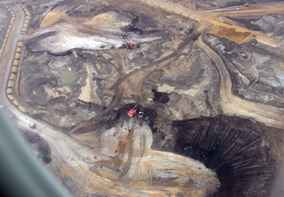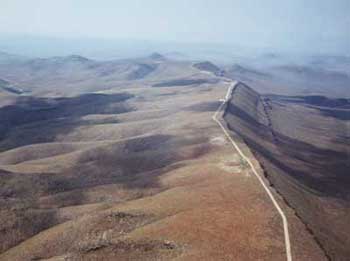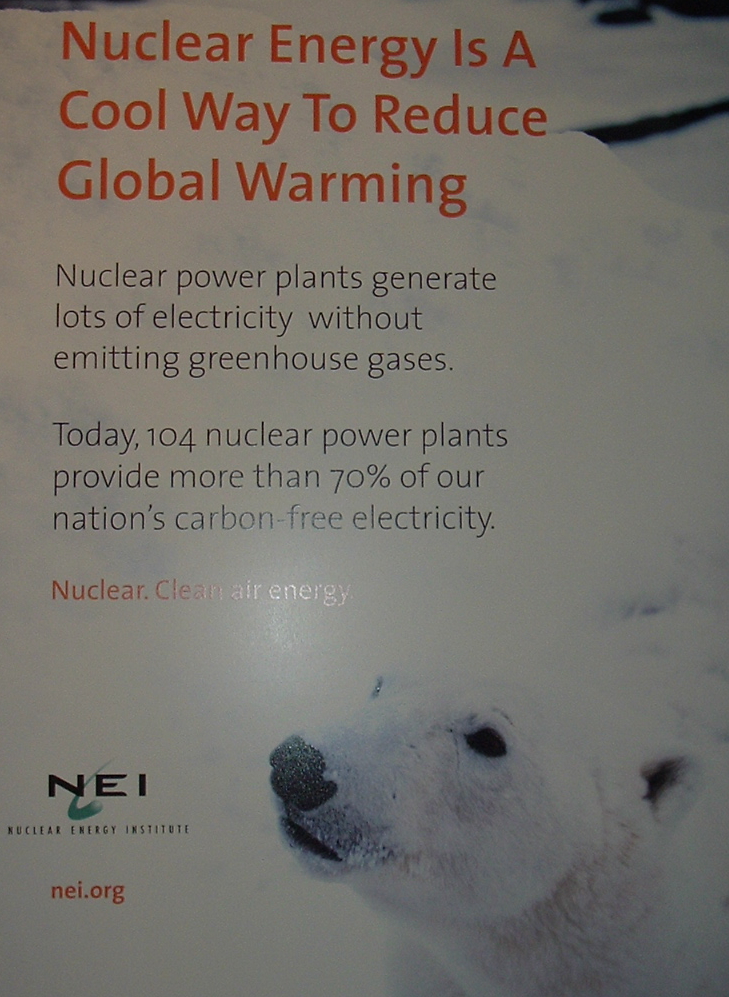Duck and Cover
Submitted by Bob Burton on
 The Alberta government has hired crisis management guru Peter Sandman to help it defuse concerns over the environmental impact of the oilsands mining industry.
The Alberta government has hired crisis management guru Peter Sandman to help it defuse concerns over the environmental impact of the oilsands mining industry.

Submitted by Bob Burton on
 The Alberta government has hired crisis management guru Peter Sandman to help it defuse concerns over the environmental impact of the oilsands mining industry.
The Alberta government has hired crisis management guru Peter Sandman to help it defuse concerns over the environmental impact of the oilsands mining industry.
Submitted by Judith Siers-Poisson on
It isn't every day that a state's largest polluter is honored. It helps when the polluter -- and its buddies -- helped found and advise the group giving the award. The Maryland-based Wildlife Habitat Council gave biodiversity conservation awards to 21 companies, including the Lafarge cement plant in Ravena, New York. The award was for Lafarge's 150-acre Deer Mountain Nature Preserve. The honor was not publicized until the company came under fire for mercury contamination near a local high school.
Submitted by Anne Landman on
 As CMD previously reported, Virginia Commonwealth University (VCU) operates a School of Medicine and a School of Public Health while enjoying a cozy relationship with the tobacco industry, especially cigarette maker
As CMD previously reported, Virginia Commonwealth University (VCU) operates a School of Medicine and a School of Public Health while enjoying a cozy relationship with the tobacco industry, especially cigarette maker
Submitted by Judith Siers-Poisson on
 Comprehensive information about what chemicals are sprayed on food crops just got much harder to come by. The U.S. Department of Agriculture recently announced that they will no longer conduct and publish annual national surveys of "which states apply the most pesticides and where bug and weed killers are most heavily sprayed to help cotton, grapes and oranges grow." The report is used extensively by farmers, environmental advocates, chemical companies and even the U.S. Environmental Protection Agency. Don Lipton, a spokesman for the American Farm Bureau, said "farmers will be subjected to conjecture and allegations about their use of chemicals and fertilizer. Given the historic concern about chemical use by consumers, regulators, activist groups and farmers, it's probably not an area where lack of data is a good idea." One fear is that information will only be available after there's been a problem. Steve Scholl-Buckwald of the Pesticide Action Network explained, "What we'll end up doing is understanding pesticide use through getting accident reports. And that's a lousy way to protect public health."
Comprehensive information about what chemicals are sprayed on food crops just got much harder to come by. The U.S. Department of Agriculture recently announced that they will no longer conduct and publish annual national surveys of "which states apply the most pesticides and where bug and weed killers are most heavily sprayed to help cotton, grapes and oranges grow." The report is used extensively by farmers, environmental advocates, chemical companies and even the U.S. Environmental Protection Agency. Don Lipton, a spokesman for the American Farm Bureau, said "farmers will be subjected to conjecture and allegations about their use of chemicals and fertilizer. Given the historic concern about chemical use by consumers, regulators, activist groups and farmers, it's probably not an area where lack of data is a good idea." One fear is that information will only be available after there's been a problem. Steve Scholl-Buckwald of the Pesticide Action Network explained, "What we'll end up doing is understanding pesticide use through getting accident reports. And that's a lousy way to protect public health."
Submitted by Diane Farsetta on
 Increasingly, people are coming to the conclusion that the proposed nuclear waste dump at Yucca Mountain, Nevada might never open. Former Louisiana Senator J. Bennett Johnston, "the lawmaker perhaps most responsible" for advancing the plan for a permanent waste repository at Yucca, now says the "project should never have been billed as a place to hold waste indefinitely," reports Lisa Mascaro.
Increasingly, people are coming to the conclusion that the proposed nuclear waste dump at Yucca Mountain, Nevada might never open. Former Louisiana Senator J. Bennett Johnston, "the lawmaker perhaps most responsible" for advancing the plan for a permanent waste repository at Yucca, now says the "project should never have been billed as a place to hold waste indefinitely," reports Lisa Mascaro.
Submitted by John Stauber on
Adweek has an interesting article examining environmental corporate social responsibility in light of the latest consumer survey data designed to help companies profit from green marketing.
 I learned many things at the Nuclear Energy Institute's (NEI's) annual meeting, but perhaps none more surprising than this: When nuclear power executives discuss the state of their industry, they highlight many of the same issues as their environmentalist opponents.
I learned many things at the Nuclear Energy Institute's (NEI's) annual meeting, but perhaps none more surprising than this: When nuclear power executives discuss the state of their industry, they highlight many of the same issues as their environmentalist opponents.
Of course, the emphasis and even the language are different. But presenters at the "Nuclear Energy Assembly," held in Chicago from May 5 to 7, discussed financing for new nuclear plants, nuclear waste storage and nuclear weapons proliferation concerns.
Nuclear power opponents argue that the industry shouldn't expect or need government support, some fifty years into its existence. In a hotel conference room populated mostly with gray-suited older white men, industry executives repeatedly called for an expansion of federal loan guarantees for new nuclear plants.
Early on in the conference, NEI president and CEO Frank L. "Skip" Bowman said, "We use loan guarantees in this country to support ship building, steel making, student loans, rural electrification, affordable housing, construction of critical transportation infrastructure, and for many other purposes. Please don't tell me that America's electric infrastructure is any less important." He added, "I wish someone would tell me when the word 'subsidy' became a slur, a four-letter word. ... What is there of value in American life that is not subsidized, to some extent?"
Submitted by John Stauber on
Columnist Dimitri Vassilaros received a news release about a grassroots "petition to stop climate alarmism" and attacking Al Gore's work.
Submitted by Judith Siers-Poisson on
 The global increase in grain prices may make the meat supply less safe. The European Union is considering a relaxation of feed bans that prohibit animal by-products being used as feed for other animals in the human food chain.
The global increase in grain prices may make the meat supply less safe. The European Union is considering a relaxation of feed bans that prohibit animal by-products being used as feed for other animals in the human food chain.
Submitted by Judith Siers-Poisson on

Center for Media and Democracy (CMD)
520 University Ave, Ste 305 • Madison, WI 53703 • (608) 260-9713
CMD is a 501(c)(3) tax-exempt non-profit.
© 1993-2025